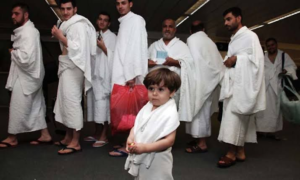Japan Inspired Hajj Nap Pods imported to Saudi Arabia
Providing accommodation for two million pilgrims is no small feat, with travellers staying in anything from five-star hotels to tents pitched in empty lots.Saudi authorities are pushing a “smart Hajj” initiative to meet the growing demands of Hajj, which coincide with the kingdom’s unprecedented modernisation drive. With such large numbers of visitors, hotel overcrowding – and this year’s weather and flood warnings – it can still be difficult for pilgrims to find a place of rest.Accommodation is also in high demand around the site and is not within financial means for many pilgrims.So, to modernise old practices (which sees many people sleeping outside in tents) and utilise space, nap pods reminiscent of Japan’s famed capsule hotels are being tested. The Kingdom is testing these capsule rooms in the western city of Mina as faithful pilgrims gather for the six-day hajj.Those seeking rest from the strenuous journey and rituals can use any of the 18-24 pods available for free.Each fibreglass pod – less than 3 metres long and more than 1 metre high – features a mattress, clean sheets, air conditioning and a large, well-lit mirror.The pods can be lined up horizontally or stacked vertically to save on space.The nap pods provide a solution for pilgrims of limited means who cannot afford to book hotels on site but need a quick rest during Hajj.Each napper will have three hours of access to the pods, which are imported from Japan at cost of about $1,114 (Dh4,100) each.The Saudi charity Haji and Mutamer Gift Charitable Association, which provides services to Mecca visitors, imported the pods from Japan, where capsule hotels are common, as an economic solution for those wanting to take breaks in crowded public areas. The pods are stackable, to take up less space.“The capsules work through a share economy, like bicycles that you can rent for an hour and then leave for someone else,” Mansour al-Amer, head of the Haji and Mutamer Gift Charitable Association, told The Guardian.Discover more from Islam Hashtag
Subscribe to get the latest posts sent to your email.






Masha Allah ! Saudi Arab always cares for its pilgrim and does khidmat of deen. Love it 🙂
Would love to See one.